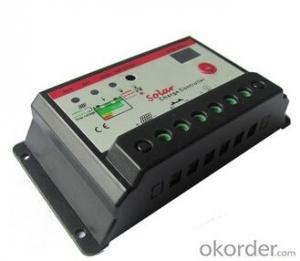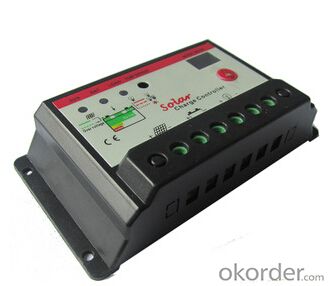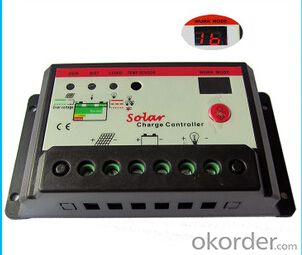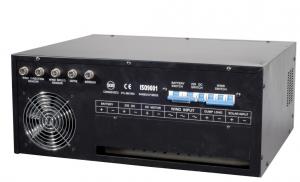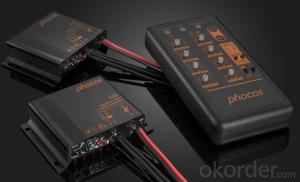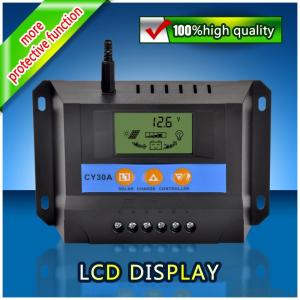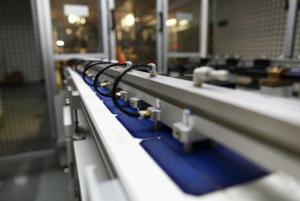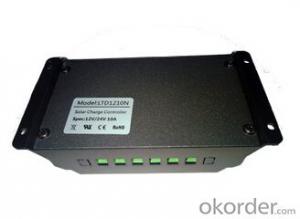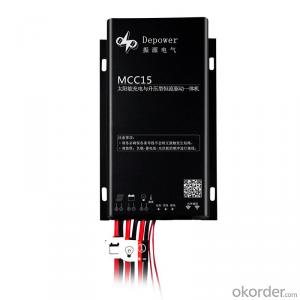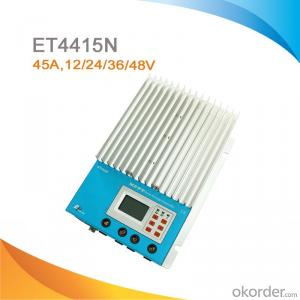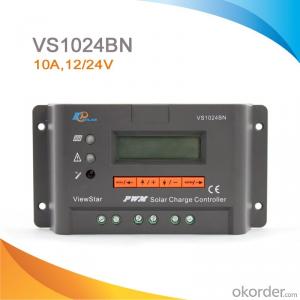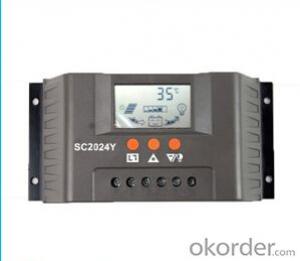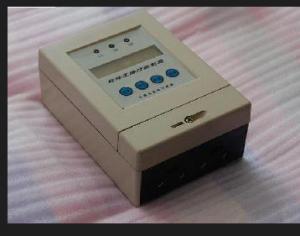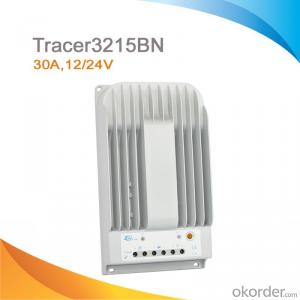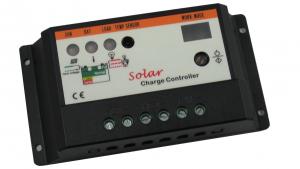60A MPPT Solar Controllers bygd Solar Charger Controller Model SC1524S for Streetlight System
- Loading Port:
- Shanghai
- Payment Terms:
- TT OR LC
- Min Order Qty:
- 10 unit
- Supply Capability:
- 50 unit/month
OKorder Service Pledge
OKorder Financial Service
You Might Also Like
Details of products:
product model: SC1524S 15A
External Size:133mm×70mm
Mounting hole Size:126mm×50mm
Performance
12V/24V automatical adaption, control and set button changed into tact key, larger contact terminal can offer wire of 6 m2
◆ double LED digital display, clear for observation
◆ recharging mode by three phases
◆ PWM pulse modulated recharging technology
◆set light-dependent control and 1-13hous time control
◆short circuit protection, overvoltage protection, overcurrent protection and lighting protection
◆standy current no more than 5mA
example
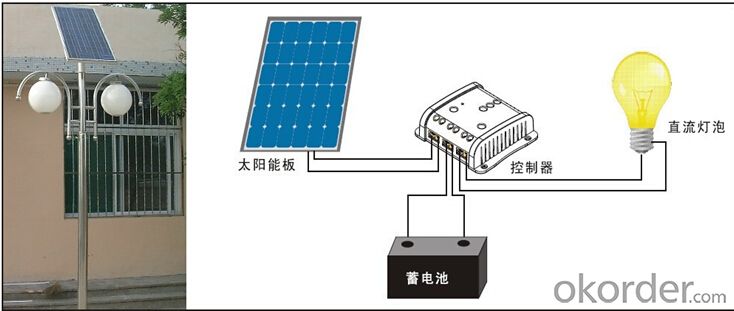
Technical characteristics
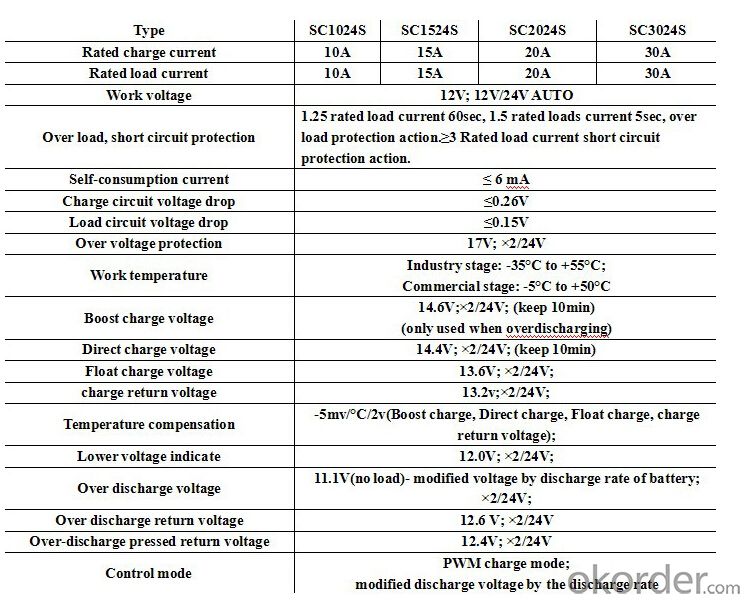
P.S.: This product is manufactured by order, so please call us for more info and service
- Q: What is the role of a solar controller in preventing over-discharge of batteries?
- The role of a solar controller in preventing over-discharge of batteries is to monitor the voltage level of the batteries and regulate the charging and discharging process. It ensures that the batteries are not drained beyond their safe operating range by disconnecting the load when the voltage drops to a certain threshold. This prevents over-discharge, which can lead to permanent damage or reduced lifespan of the batteries.
- Q: Can a solar controller be used with different types of solar power systems?
- Different types of solar power systems can utilize a solar controller. A solar controller, also known as a charge controller, is responsible for regulating the power flow between the solar panels and the battery or grid. Its main function is to ensure efficient battery charging and prevent overcharging or discharging. Solar power systems can be classified into two categories: off-grid and grid-tied systems. Off-grid systems are typically employed in remote areas where there is no access to the utility grid, whereas grid-tied systems are connected to the utility grid. Solar controllers are compatible with both off-grid and grid-tied systems. In off-grid systems, the solar controller manages the battery's charging and discharging processes to ensure optimal performance and extend battery life. It also safeguards the battery from potential damage caused by overcharging or over-discharging. On the other hand, the role of a solar controller in grid-tied systems differs. It monitors the power output of the solar panels and ensures synchronization with the utility grid. Moreover, it efficiently manages any excess power generated by the solar panels, redirecting it to the grid or other loads. By doing so, it maximizes the system's efficiency and offers the potential to earn credits through net metering programs. In conclusion, a solar controller is an essential component in any solar power system, regardless of its type. It effectively regulates power flow, protects the battery, and optimizes system performance. Therefore, it can be utilized in different types of solar power systems to enhance their efficiency and reliability.
- Q: Can a solar controller be used with solar panels that are connected to a solar air conditioning system?
- Yes, a solar controller can be used with solar panels that are connected to a solar air conditioning system. A solar controller is typically used to regulate the charging and discharging of batteries in a solar power system. In the case of a solar air conditioning system, the solar controller can help manage the power generated by the solar panels and ensure that it is efficiently utilized to power the air conditioning unit. This helps optimize the system's performance and maximize energy savings.
- Q: How do I determine the maximum load output voltage for a solar controller?
- To determine the maximum load output voltage for a solar controller, you need to consider a few factors. 1. Consult the controller's specifications: Check the user manual or product specifications provided by the manufacturer. The maximum load output voltage is usually mentioned in these documents. Look for the "maximum load voltage" or a similar term. 2. Consider the solar panel voltage: The solar controller regulates the voltage from the solar panel to the load. Therefore, the maximum load output voltage should be lower than the maximum voltage that the solar panel can produce. Ensure that the controller's maximum load output voltage is compatible with the solar panel's specifications. 3. Consider the load voltage requirements: Determine the voltage requirements of the devices or appliances you plan to connect to the solar controller. Ensure that the maximum load output voltage of the controller is suitable for powering these devices. If the load voltage requirements are lower than the controller's maximum load output voltage, it should work fine. 4. Safety precautions: It is important to note that exceeding the maximum load output voltage can potentially damage the connected devices or appliances. Therefore, it is crucial to ensure that the load voltage requirements are within the specified range of the solar controller. By considering the controller's specifications, the solar panel voltage, load voltage requirements, and taking necessary safety precautions, you can determine the maximum load output voltage for a solar controller effectively.
- Q: Can a solar controller be used with solar-powered electric vehicle charging stations?
- Yes, a solar controller can be used with solar-powered electric vehicle charging stations. A solar controller is designed to regulate the flow of electricity from solar panels to the charging station, ensuring optimal charging efficiency and preventing overcharging or damage to the battery. It helps manage the power generated by the solar panels and directs it towards charging electric vehicles, making it an essential component for solar-powered charging stations.
- Q: Can a solar controller be used with solar-powered indoor educational institutions?
- Yes, a solar controller can be used with solar-powered indoor educational institutions. A solar controller is responsible for regulating and managing the flow of electricity from solar panels to the battery bank. It ensures that the battery is charged efficiently and protects it from overcharging or discharging. Therefore, even if the solar panels are installed indoors, a solar controller can still be utilized to optimize the energy generation and storage process, making it suitable for solar-powered indoor educational institutions.
- Q: What is the maximum operating altitude of a solar controller?
- The maximum operating altitude of a solar controller typically depends on the specific model and manufacturer. However, most solar controllers can operate effectively at altitudes up to 4,000 meters (13,123 feet) above sea level. It is important to refer to the product specifications or consult the manufacturer for accurate information regarding a particular solar controller's maximum operating altitude.
- Q: Can a solar controller be used with a battery bank that has different battery chemistries?
- No, a solar controller cannot be used with a battery bank that has different battery chemistries. It is essential to use batteries with the same chemistry in a battery bank to ensure proper charging and discharging cycles. Mixing different battery chemistries can lead to imbalances, inefficient charging, and potential damage to the batteries.
- Q: Can a solar controller be used in a solar-powered swimming pool system?
- Yes, a solar controller can be used in a solar-powered swimming pool system. A solar controller helps to regulate and optimize the charging of batteries and the use of solar energy in a system. In the case of a solar-powered swimming pool system, the solar controller would help manage the flow of solar energy to heat the pool water and ensure efficient operation of the system.
- Q: Can a solar controller be used with a solar-powered event space?
- Yes, a solar controller can definitely be used with a solar-powered event space. A solar controller helps regulate and optimize the charging of batteries or other energy storage systems connected to solar panels. It ensures efficient and safe utilization of solar energy, managing the flow of power and preventing overcharging or damage to the batteries. Using a solar controller would be essential in maintaining a reliable and sustainable power supply for a solar-powered event space.
Send your message to us
60A MPPT Solar Controllers bygd Solar Charger Controller Model SC1524S for Streetlight System
- Loading Port:
- Shanghai
- Payment Terms:
- TT OR LC
- Min Order Qty:
- 10 unit
- Supply Capability:
- 50 unit/month
OKorder Service Pledge
OKorder Financial Service
Similar products
Hot products
Hot Searches
Related keywords
